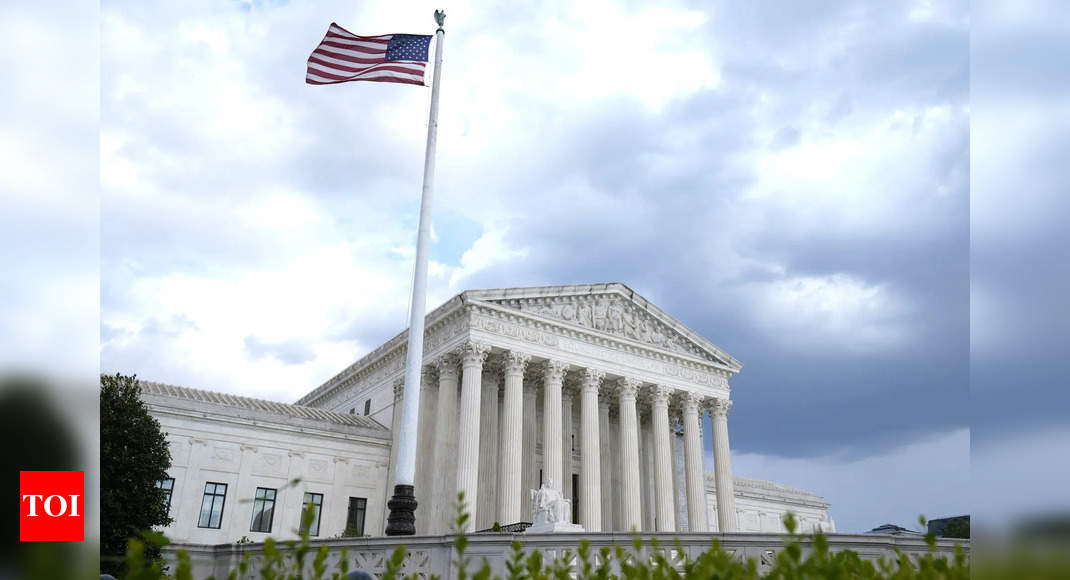
The US Supreme Court on Friday declined to allow President Joe Biden‘s administration to enforce a significant portion of a new rule aimed at protecting LGBT students from discrimination in schools and colleges based on gender identity. The decision impacts 10 Republican-led states that challenged the rule, marking a setback for the administration’s efforts to expand protections under Title IX.
The justices denied the administration’s request to partially lift lower court injunctions that had blocked the rule, which was set to take effect on August 1. The rule was designed to clarify that discrimination “on the basis of sex” under Title IX includes sexual orientation and gender identity. This rule would have extended protections to LGBT students in federally funded education programs.
The lawsuits were filed by a coalition of states, including Louisiana, Tennessee, and Kentucky, along with other plaintiffs who argued that the rule would force schools to accommodate transgender students in ways that they claimed could compromise the safety and privacy of other students. The states argued that the rule exceeded federal authority and represented an overreach by the Biden administration.
Louisiana Attorney General Liz Murrill criticized the rule, stating, “This is all for a political agenda, ignoring significant safety concerns for young women students.” She argued that the rule would compel schools to change their policies regarding restrooms, locker rooms, and pronoun usage, which she deemed “enormously invasive.”
In defense of the rule, US Assistant Secretary for Civil Rights Catherine Lhamon said, “These final regulations clarify Title IX’s requirement that schools promptly and effectively address all forms of sex discrimination. We look forward to working with schools, students, and families to prevent and eliminate sex discrimination.”
Despite the Supreme Court’s refusal to lift the injunctions, the administration maintained that most of the rule’s provisions are unrelated to gender identity and should still be allowed to take effect. However, it agreed to keep certain provisions, including those related to restrooms and locker rooms, blocked while the legal battles continue.
This legal challenge is part of a broader trend, with similar lawsuits blocking the law in 22 states, mostly governed by Republicans. The court’s decision comes ahead of its next term, where it will also hear a case from Tennessee involving a ban on gender-affirming medical care for transgender minors.
The Biden administration has argued that the rule aligns with the Supreme Court’s 2020 decision, which held that a similar law, Title VII, protects gay and transgender employees from workplace discrimination. However, lower courts in Louisiana and Kentucky concluded that Title IX’s reference to sex pertains only to “biological” males and females, leading to the current legal impasse.
The justices denied the administration’s request to partially lift lower court injunctions that had blocked the rule, which was set to take effect on August 1. The rule was designed to clarify that discrimination “on the basis of sex” under Title IX includes sexual orientation and gender identity. This rule would have extended protections to LGBT students in federally funded education programs.
The lawsuits were filed by a coalition of states, including Louisiana, Tennessee, and Kentucky, along with other plaintiffs who argued that the rule would force schools to accommodate transgender students in ways that they claimed could compromise the safety and privacy of other students. The states argued that the rule exceeded federal authority and represented an overreach by the Biden administration.
Louisiana Attorney General Liz Murrill criticized the rule, stating, “This is all for a political agenda, ignoring significant safety concerns for young women students.” She argued that the rule would compel schools to change their policies regarding restrooms, locker rooms, and pronoun usage, which she deemed “enormously invasive.”
In defense of the rule, US Assistant Secretary for Civil Rights Catherine Lhamon said, “These final regulations clarify Title IX’s requirement that schools promptly and effectively address all forms of sex discrimination. We look forward to working with schools, students, and families to prevent and eliminate sex discrimination.”
Despite the Supreme Court’s refusal to lift the injunctions, the administration maintained that most of the rule’s provisions are unrelated to gender identity and should still be allowed to take effect. However, it agreed to keep certain provisions, including those related to restrooms and locker rooms, blocked while the legal battles continue.
This legal challenge is part of a broader trend, with similar lawsuits blocking the law in 22 states, mostly governed by Republicans. The court’s decision comes ahead of its next term, where it will also hear a case from Tennessee involving a ban on gender-affirming medical care for transgender minors.
The Biden administration has argued that the rule aligns with the Supreme Court’s 2020 decision, which held that a similar law, Title VII, protects gay and transgender employees from workplace discrimination. However, lower courts in Louisiana and Kentucky concluded that Title IX’s reference to sex pertains only to “biological” males and females, leading to the current legal impasse.









